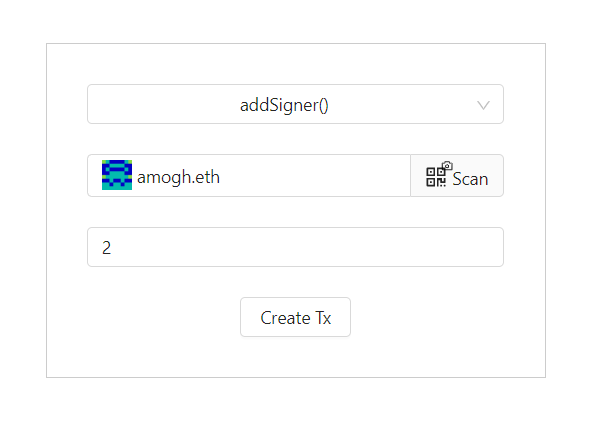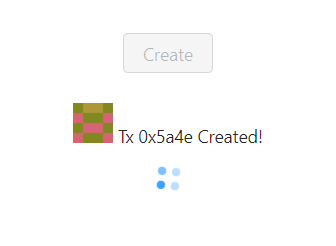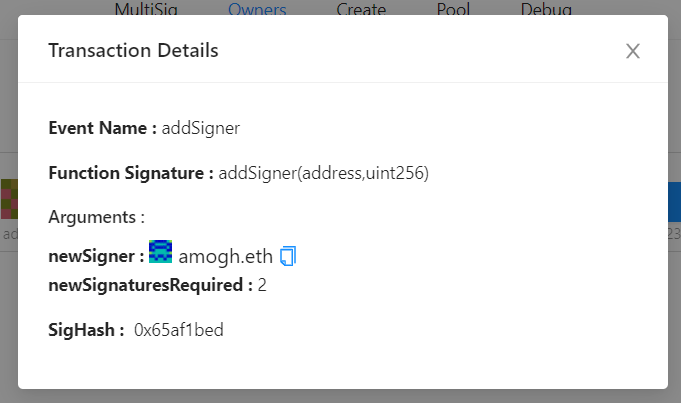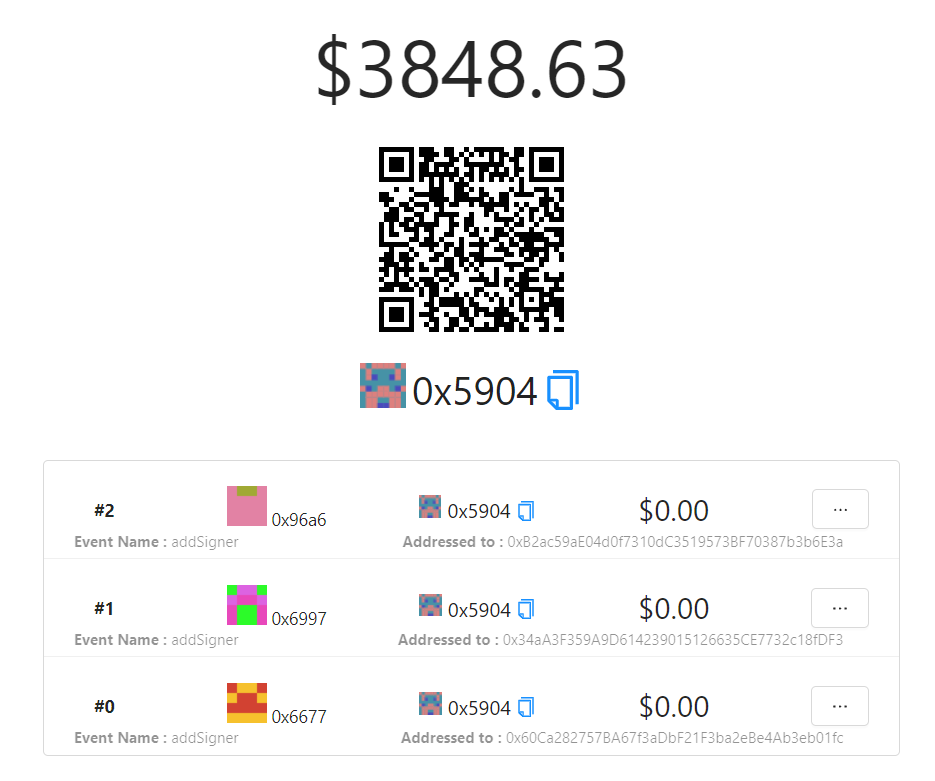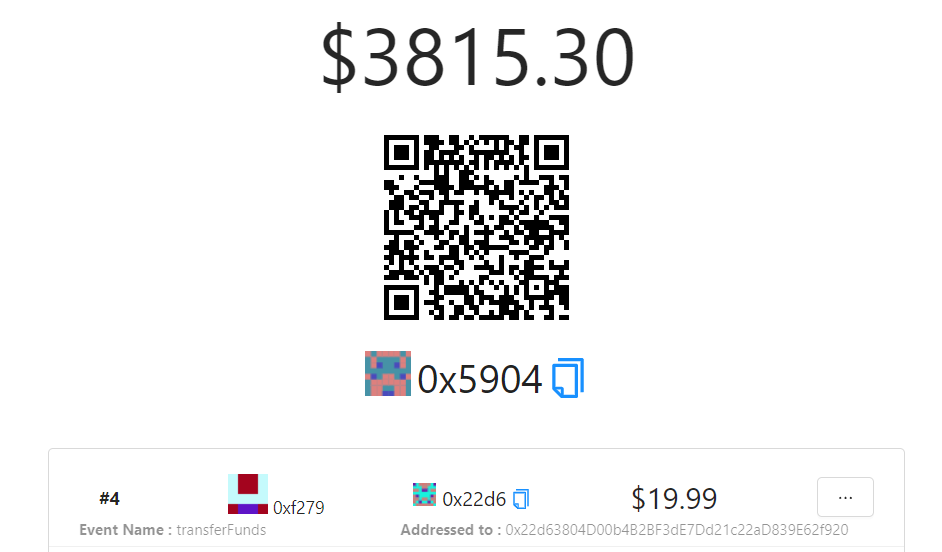This is a smart contract that acts as an off-chain signature-based shared wallet amongst different signers that showcases use of meta-transaction knowledge and ECDSA recover(). If you are looking for the challenge, go to the challenges repo within scaffold-eth!
If you are unfamiliar with these concepts, check out all the ETH.BUILD videos by Austin Griffith, especially the Meta Transactions one!
At a high-level, the contract core functions are carried out as follows:
Off-chain: ⛓🙅🏻♂️ - Generation of a packed hash (bytes32) for a function call with specific parameters through a public view function . - It is signed by one of the signers associated to the multisig, and added to an array of signatures (bytes[] memory signatures)
On-Chain: ⛓🙆🏻♂️
bytes[] memory signaturesis then passed intoexecuteTransactionas well as the necessary info to userecover()to obtain the public address that ought to line up with one of the signers of the wallet.- This method, plus some conditional logic to avoid any duplicate entries from a single signer, is how votes for a specific transaction (hashed tx) are assessed.
- If it's a success, the tx is passed to the
call(){}function of the deployed MetaMultiSigWallet contract (this contract), thereby passing theonlySelfmodifier for any possible calls to internal txs such as (addSigner(),removeSigner(),transferFunds(),updateSignaturesRequried()).
Cool Stuff that is Showcased: 😎
- NOTE: Showcases how the
call(){}function is an external call that ought to increase the nonce of an external contract, as they increment differently from user accounts. - Normal internal functions, such as changing the signers, and adding or removing signers, are treated as external function calls when
call()is used with the respective transaction hash. - Showcases use of an array (see constructor) populating a mapping to store pertinent information within the deployed smart contract storage location within the EVM in a more efficient manner.
required: Node plus Yarn and Git
git clone https://github.com/scaffold-eth/scaffold-eth-challenges challenge-5-multisig
cd challenge-5-multisig
git checkout challenge-5-multisigyarn install
yarn chain
in a second terminal window:
cd challenge-5-multisig
yarn start
🔏 Edit your smart contract MultiSigWallet.sol in packages/hardhat/contracts
📝 Edit your frontend App.jsx in packages/react-app/src
💼 Edit your deployment script deploy.js in packages/hardhat/scripts
📱 Open http://localhost:3000 to see the app
in a third terminal window:
yarn backend
🔧 Configure your deployment in packages/hardhat/scripts/deploy.js
Edit the chainid, your owner addresses, and the number of signatures required:
in a fourth terminal deploy with your frontend address as one of the owners:
yarn deploy
Use the faucet wallet to send your multi-sig contract some funds:
To add new owners, use the "Owners" tab:
This will take you to a populated transaction create page:
Create & sign the new transaction:
You will see the new transaction in the pool (this is all off-chain):
Click on the ellipsses button [...] to read the details of the transaction
Give your account some gas at the faucet and execute the transaction
The transction will appear as "executed" on the front page:
Create a transaction to send some funds to your frontend account:
This time we will need a second signature:
(You'll notice you don't need ⛽️gas to sign transactions.)
Execute the transction to transfer the funds:
(You might need to trigger a new block by sending yourself some faucet funds or something. HartHat blocks only get mined when there is a transaction.)
💼 Edit your deployment script deploy.js in packages/hardhat/scripts
🔏 Edit your contracts form, MetaMultiSigWallet.sol in packages/hardhat/contracts
📝 Edit your frontend in packages/react-app/src/views
You may not want every signer to create new transfers, only allow them to sign existing transactions or a mega-admin role who will be able to veto any transaction.
Make a MultiSig wallet to store your precious doodle-NFTs!?
🛰 Ready to deploy to a testnet?
Change the
defaultNetworkinpackages/hardhat/hardhat.config.js
🔐 Generate a deploy account with yarn generate
👛 View your deployer address using yarn account (You'll need to fund this account. Hint: use an instant wallet to fund your account via QR code)
👨🎤 Deploy your wallet:
yarn deploy✏️ Edit your frontend
App.jsxinpackages/react-app/srcto change thetargetNetworkto wherever you deployed your contract:
You should see the correct network in the frontend:
Also change the poolServerUrl constant to your deployed backend (via yarn backend)
Alternatively you can use the pool server url in the above screenshot
You will need to get a key from infura.io and paste it into
constants.jsinpackages/react-app/src:
⚙️ build and upload your frontend and share the url with your friends...
# build it:
yarn build
# upload it:
yarn surge
OR
yarn s3
OR
yarn ipfs👩❤️👨 Share your public url with friends, add signers and send some tasty ETH to a few lucky ones 😉!!
(Written by: @umphams)
Join the telegram support chat 💬 to ask questions and find others building with 🏗 scaffold-eth!
🙏 Please check out our Gitcoin grant too!


